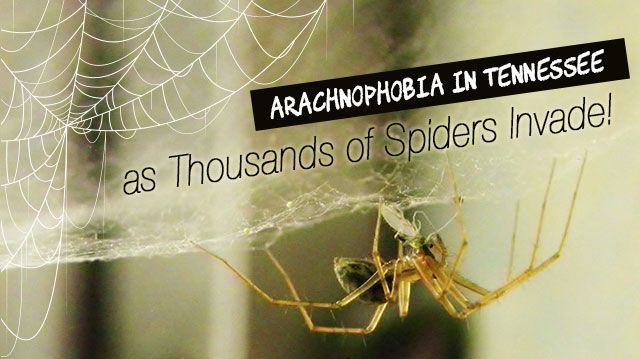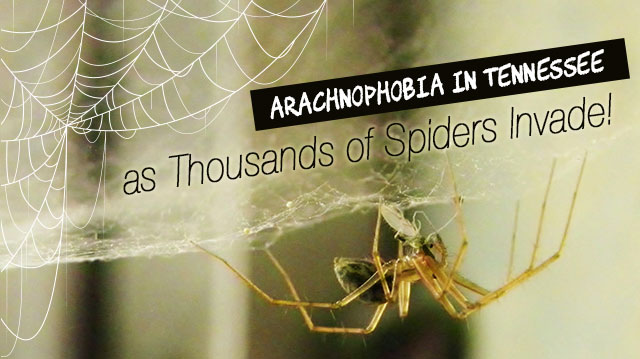
Residents of North Memphis, Tennessee have been shaken by a spider invasion. Thousands of sheetweb spiders have banded together to form an arachnid army and constructed a web that stretches nearly half a mile long.
“It’s like a horror movie,” North Memphis resident Debra Lewis told WMC, a CNN affiliate. If you are the least bit frightened by one spider lurking on your bedroom wall, then this webby situation may send you into a fit of hysteria.
The half-mile-long web created by sheetweb spiders is a natural occurrence, according to Steve Reichling, a curator at the Memphis Zoo. Reichling noted that the harmless arachnids were undergoing a “mass dispersal.” He told WMC, “It’s a mass dispersal of the millions of tiny spiders that have always been in that field, unnoticed till now.”
However harmless, residents of North Memphis continue battling these tiny home intruders. “When I got up this morning, it was like spiders all over my door, they were coming in my house,” North Memphis resident Frances Ward told reporters.
“I’ve seen about 20 on my porch just in the last day,” a neighbor reported. North Memphis residents want the city to take action and begin spraying the area in hopes of ridding the town of the spider invasion.
This is not the first time insects or animals have invaded a town. This recent invasion in Tennessee is a reminder that humans are not alone on the planet. Regardless of where you live, whether it be a remote area or an urban setting, you share your small plot on the Earth with many living creatures.
 Most animal invasions happen after a natural disaster of some kind. In 2011, a wildfire in Los Alamos, New Mexico, named the Los Conchas Fire — one of the largest in the state’s history — displaced people and wildlife alike. When residents returned to their homes after evacuation notices had been lifted, they found they had a few new neighbors — of the furry variety. Black bears had taken refuge in the city during the fires, and returning residents had quite a surprise.
Most animal invasions happen after a natural disaster of some kind. In 2011, a wildfire in Los Alamos, New Mexico, named the Los Conchas Fire — one of the largest in the state’s history — displaced people and wildlife alike. When residents returned to their homes after evacuation notices had been lifted, they found they had a few new neighbors — of the furry variety. Black bears had taken refuge in the city during the fires, and returning residents had quite a surprise.
In other cases of animal invasions, a shift in ecology may contribute to a sudden cohabitation between animals and humans. According to reports, in February 2011, more than 400 wolves wreaked havoc on the small town of Verkhoyansk in northeastern Russian. The wolves killed nearly 30 horses and other livestock in just four days, sparking a state of emergency. A decrease in the rabbit population, a staple food source for the wolves, was thought to be linked to the sudden influx of hungry wolves in the town.
Any glitch in the natural way of things can certainly have an effect on human and animal interactions, derailing the ecosystem for a short while. These little reminders can be unpleasant for humans, like for the residents of North Memphis. However, we often forget that we are part of something much bigger as we attempt to stake our claim on the land and exert our dominance over all living things. It is imperative to remember that we are not alone in the world, and our human issues most certainly impact our animal friends.
How would you react to a spider invasion?
-Stephen Seifert
Stephen Seifert is a writer, professor, adventurer and a health & fitness guru. His flair for travel and outdoor adventure allows him to enjoy culture and traditions different than his own. A healthy diet, routine fitness and constant mental development is the cornerstone to Stephen’s life.
Sources:
http://www.wmcactionnews5.com/story/30573866/millions-of-spiders-infest-mid-south-neighborhood
http://www.telegraph.co.uk/news/worldnews/europe/russia/9783783/Wolf-attacks-lead-to-state-of-emergency-in-Russias-Siberia-region.html
http://www.dailymail.co.uk/news/article-2012076/Los-Alamos-bears-wildlife-displaced-forest-fires-invade-city.html
http://blogs.britannica.com/2011/08/unexpected-visitors-wildlife-invasions-towns-cities

